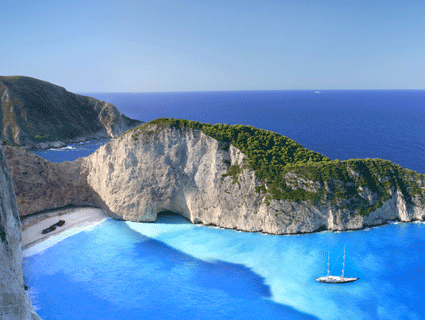
<a href="http://www.shutterstock.com">Samot</a>/Shutterstock
The green crowd used to feel pretty rosy about Greece. After former Prime Minister George Papandreou was elected in 2009, he set up a government ministry to study the environment, energy, and climate change, and he talked up initiatives on eco-tourism and renewable energy. But now, after six years of recession, the country has begun buying into several new environmentally damaging development schemes to generate liquidity, the New York Times reports.
Partly as an effort to appease lenders like the International Monetary Fund, the European Central Bank and the European Commission, Greece has new plans to “sell off thousands of acres for solar fields and allow oil exploration near delicate ecosystems,” as well as international mining operations for copper, zinc, and lead, according to the Times. But the most controversial project by far is a new open-pit gold mine and a processing plant in the north of the country, run by Canada’s Eldorado Gold Corporation.
Proponents say the project could bring in 1,500 jobs, but a growing protest movement charges that the operation is “nothing more than a symbol of Greece’s willingness these days to accept any development, no matter the environmental cost,” according to the Times. “Only 10 years ago, they like to point out, Greece’s highest court ruled that the amount of environmental damage that mining would do here was not worth the economic gain.”
“The dust this will create will be killing off the leaves. There will be no goats or olives or bees here,” Christos Adamidis, a hotel owner in the area, told the Times. “This will be a business for 10, maybe 15 years, and then this company will just disappear, leaving all the pollution behind like all the others did.”
The World Wide Fund for Nature said that environmental standards accross the country are are largely being ignored, “from the reduction of mandatory environmental impact reviews to plans for increasing coal use,” as the country’s natural resources are parcelled out, according to the Times. And it’s not clear whether the environmental fire sale will help generate the revenue Greece’s leaders seek: The government reportedly didn’t even secure a percentage of gold earnings for itself in the Eldorado deal.
Conservative Republicans in the United States have long used the spectre of Athens to trash government spending. “What is calamitous is the path we’re on as a nation,” Sen. Lindsey Graham said in 2011 during the first debt-ceiling debate. “We’re becoming Greece.” For once, US conservatives’ warnings could be right: The Hellenic nation’s corporate-friendly environmental selloff appears to deepen ecological woes while failing to solve the nation’s fiscal crisis. It remains to be seen whether the right in America will take that lesson to heart.










